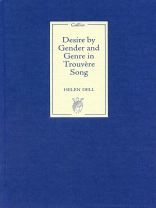Unspoken desire in trouvère song.
This study brings the songs of the
trouvères to an encounter with Lacanian psychoanalytic theories of signification, sexual difference and unconscious desire. In
trouvère song desire functions as a means of generic and ‘genderic’ differentiation. The
trouvères distinguished between sexual need or lust and desire, the latter usually confined to the masculine voice in high style. Less exalted persons, in whose company women were alreadyimplicitly included, appear as incapable of desire in the
fin’amors register. Critics have treated the issue of desire as represented in the courtly
chanson but, because criticism has followed the
trouvères’ distinction between desire and need, discussion of desire has been limited to songs in the courtly register rather than across the system of genres.
Desire in Lacan’s sense, that is unconscious desire, is present in all genres and voices and this book unearths the unspoken desires of
trouvère song by an attention to the characteristic means by which subjects subvert their demands in different genres.
HELEN DELL is a research fellowin English Literary Studies in the School of Culture and Communication, University of Melbourne.
สารบัญ
Introduction: A Kaleidoscope of
différance
The Song System I: An Unstable Hierachy: the Unmarked Masculine
The Song System II: The Ignoble Words of Eve: Femininity in the System
Desire by Gender and Genre I: Low Lusts and High Desires,
pastourelle and
chanson
Desire by Gender and Genre II: Ignoble Desires of the Triumphalist
chanson d’ ami
Chronotypes of Desire I: Case-study of a
malmariée: Feminine Space/ Times
Chronotypes of Desire II: The Contained and Containing Heart: Masculine Space/Times
Desiring Differently: The
chanson in the Feminine Voice
Afterthoughts: `'[T]hat’s not it’ and ‘that’s still not it”
Bibliography
Index












